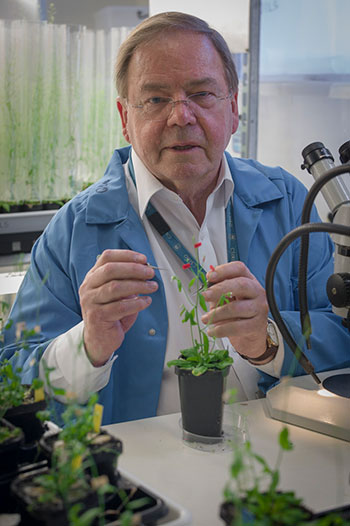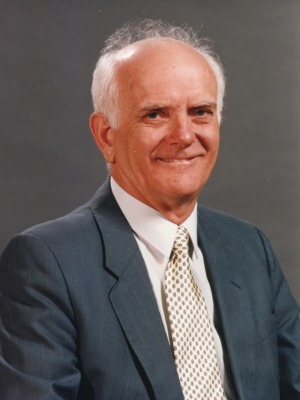Professor Chris Goodnow FAA FRS – joint recipient of the Max Cooper Prize in Immunology from Emory University
Professor Martin Green AM FAA FTSE FRS – awarded the Faraday Medal from the UK Institution of Engineering and Technology
Professor Glenn King FAA FAHMS – elected as a Fellow to the Australian Academy of Health and Medical Sciences
Professor Jose Polo FAA FAHMS – elected as a Fellow to the Australian Academy of Health and Medical Sciences
Professor Richard Robson FAA FRS Nobel Laureate – one of three scientists to win the 2025 Nobel Prize in Chemistry
(14/12/1937 – 21/10/2025)

Dr Jim Peacock was President of the Academy from 2002 to 2006 and served as Chief Scientist of Australia from 2006 to 2008. He was elected to the Academy in 1976 for his significant contributions to the understanding of the molecular architecture of chromosomes. He demonstrated the separation in time of DNA replication and crossing over by breakage-reunion. He established the basis of meiotic drive (segregation distortion) in terms of sperm morphogenesis in Drosophila and showed that highly repeated DNA sequences occur in the centromeric regions of chromosomes, are chromosome-specific, and highly conserved.
Dr Peacock was born in Leura, NSW. He graduated from the University of Sydney with a BSc (First Class Honours) in 1958 and a PhD in 1963. In 1963 he took a position as visiting research worker with CSIRO and later that year moved to the University of Oregon as postdoctoral fellow. Dr Peacock remained in Oregon as Visiting Associate Professor from 1964 to 1965 then worked as a research consultant in the biology division at Oak Ridge National Laboratory, Tennessee. In 1965 Jim returned to Australia but maintained connections with the United States as Adjunct Professor of Biology, University of California, San Diego (1969–1970) and Visiting Professor of Biochemistry, Stanford University (1970–1971). Back in Australia Dr Peacock joined CSIRO as Senior Research Scientist in the Division of Plant Industry. Dr Peacock remained at CSIRO, progressing through the organisation over the years to Chief of the Division of Plant Industry in 1978 until 2003 when he became a CSIRO Fellow.
Dr Peacock received several Honorary Doctorates and many honours and medals over the years including the Australian Society for Biochemistry and Molecular Biology’s Lemberg Medal (1978); the Macfarlane Burnet Medal and Lecture (1989); the NSW Government’s Farrer Memorial Trust Medal (1999); the Centenary Medal (2001); the CSIRO Lifetime Achievement Medal (2005); and ACT Senior Australian of the Year (2013). In 1994 he was appointed a Companion of the Order of Australia. Along with Dr Liz Dennis AC FAA FTSE, Dr Peacock was awarded the inaugural Prime Minister’s Prize for Science in 2000.
Dr Peacock was an International Member of the US National Academy of Sciences, a Foreign Fellow of the Indian National Science Academy, and a Fellow of the Royal Society and the Australian Academy of Technological Sciences and Engineering.
During Dr Peacock’s presidency, he introduced Primary Connections which is still used in Australian primary schools today. He gave his time very generously to the Academy over four decades, serving two terms on both Council and EXCOM, serving on many committees, and as the ACT Regional Chair.
Dr Peacock was interviewed by Dr Liz Dennis in 2008 for the Academy's ‘Conversations with Australian scientists’.
Read the Academy's press release
(1935–2025)

Professor Joe Wiskich was one of Australia’s most eminent plant biochemists who mentored two generations of plant biologists. He was elected to the Academy in 1994 for his contribution to the understanding of the organisation and regulation of plant mitochondrial function. He was among the first advocates of the chemiosmotic hypothesis of energy transduction. Professor Wiskich pioneered the isolation and study of organelles, especially mitochondria and chloroplasts from plants, and he went on to make many more seminal contributions to energy metabolism and ion transport in plants.
Professor Wiskich was born in 1935 in Tully, Queensland. He completed his BSc(Hons) and PhD at the University of Sydney then took up postdoctoral fellowships at the Johnson Research Foundation, the University of Pennsylvania, and in the Department of Sub-Tropical Horticulture, University of California, Los Angeles. Professor Wiskich moved back to Australia in 1964, having accepted a lectureship in the Botany Department at the University of Adelaide. He stayed at Adelaide for the remainder of his career, progressing to Professor. He also served terms as Head of Department and Chair of the Executive Committee. Professor Wiskich formally retired from the University of Adelaide in 2000 but continued his research as a Professorial Fellow at the Flinders University School of Biological Sciences.
Professor Wiskich was a life member of the Australian Society of Plant Scientists. He was awarded the Royal Society of South Australia’s Verco Medal in 1997.
Professor Wiskich gave his time generously to the Academy. He served on the National and Sectional Committees, as well as the Academy’s Council (1999–2002).
Alongside the many fascinating history of science articles published in our journal, Historical Records of Australian Science, we publish biographical memoirs – biographies of deceased Fellows commissioned by the Academy. We are very grateful to all the authors who go to great lengths to make these articles as complete as possible.
Recent biographical memoirs:
© 2025 Australian Academy of Science